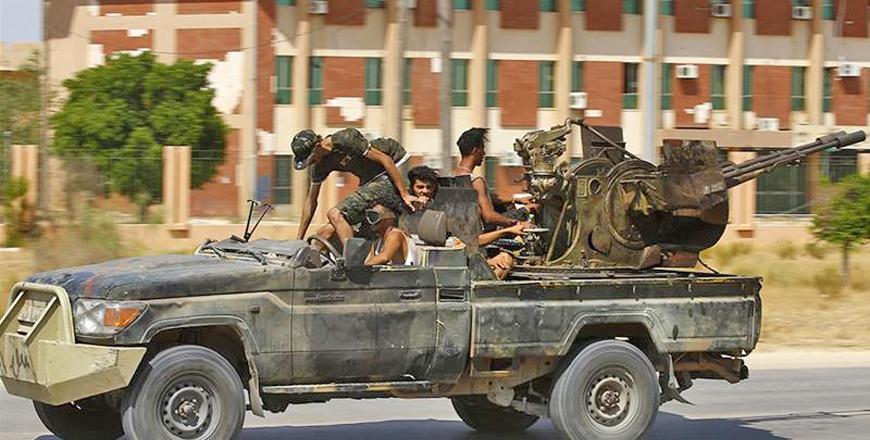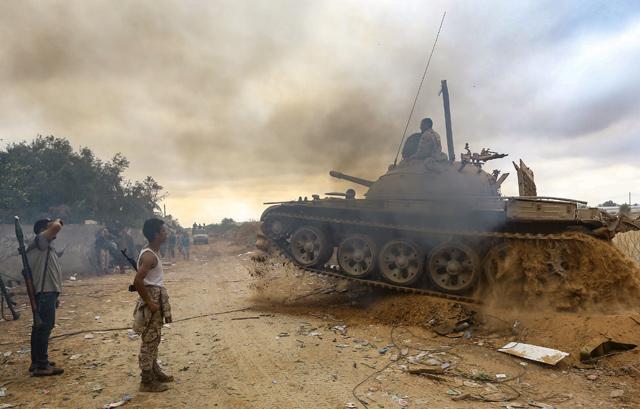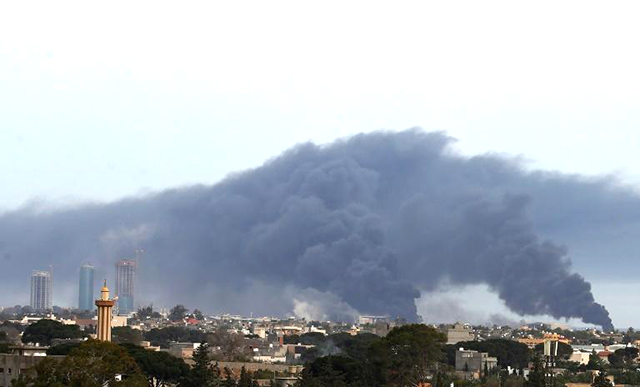You are here
Libya: Eight-month offensive to seize the capital
By AFP - Jan 02,2020 - Last updated at Jan 02,2020

On December 27, the GNA forces announced they had made progress in the Tripoli airport area and captured 10 LNA soldiers south of the capital (AFP photo)
TRIPOLI — Libya's UN-recognised government, based in Tripoli, has been under attack since April 2019 by forces of military strongman Khalifa Haftar who wants to capture the capital.
After Turkey's parliament approved on Thursday a military deployment to support the Government of National Accord (GNA), here is a summary of Haftar's offensive.
Advance on Tripoli
On April 4, 2019, Haftar orders his troops to "advance" on Tripoli, seat since 2016 of the GNA which he claims is backed by "terrorist" groups.
Haftar supports a parallel administration based in the eastern city of Tobruk, and his forces already control the country's main southern oil fields.
His self-styled Libyan National Army briefly seizes Tripoli's war-destroyed international airport but is pushed back on April 5.
Government strikes back
Government forces announce a counteroffensive called "Volcano of Anger" on April 7.
As clashes claim dozens of lives, Haftar's aircraft carry out a strike against Tripoli's only functioning airport, Mitiga, on April 8. It damages the runway but causes no casualties.
On April 19, the White House says President Donald Trump recognised Haftar's "significant role in fighting terrorism and securing Libya's oil resources".
Fighting intensifies south of Tripoli.
On June 26, GNA forces deliver a major blow to Haftar's group by retaking the town of Gharyan, its main supply base southwest of the capital.
Migrant centre hit
Late on July 2, an air strike hits a migrant detention centre in a Tripoli suburb. Fifty-three people are killed and 130 wounded. The GNA blames Haftar's forces, who deny responsibility.
There is international outcry and demands for a ceasefire.
International involvement
On November 5, The New York Times reports that Russia has sent around 200 mercenaries to Libya. Moscow denies that it has dispatched the fighters, who are said to be backing Haftar.
On the 15, the United States urges Haftar to end his offensive.
On the 27, Turkey signs a military and maritime cooperation deal with the Tripoli government. On December 10, Turkish President Recep Tayyip Erdogan says he is also ready to send troops, if requested.
A UN report accuses several countries of breaching a 2011 arms embargo by supplying the belligerent parties.
Turkey's approves military aid
On December 12, Haftar announces a new "decisive battle" and "the advance on the heart of Tripoli". The GNA says the situation is "under control" and its troops are holding their positions.
On the 19, the GNA cabinet approves the implementation of the military deal reached with Turkey the previous month.
The following day it calls for security assistance from other "friendly countries", including the United States and Britain.
UN envoy Ghassan Salame on December 30 warns of a dangerous "internationalisation" of the conflict and the Arab League calls for measures to "prevent foreign interference".
Turkey's parliament on January 2 passes a bill approving a military deployment to shore up the GNA. There are no details.
More than 280 civilians have been killed since the start of the offensive, according to the UN. The fighting has displaced 146,000 people and claimed the lives of more than 2,000 fighters.
Related Articles
TRIPOLI — Libya's UN recognised government Sunday condemned overnight air raids against a recently recaptured strategic air base in the west
TRIPOLI — Two months ago Libya's military strongman Khalifa Haftar launched an offensive to seize the capital Tripoli, the seat of the inter
TRIPOLI — Libya's UN-recognised government scored another battlefield victory on Monday against strongman Khalifa Haftar, capturing a key re

















